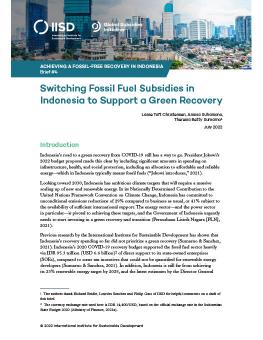
Switching Fossil Fuel Subsidies in Indonesia to Support a Green Recovery
Achieving a Fossil-Free Recovery in Indonesia | Brief 4
Indonesia is holding the G20 Presidency in 2022 with “Sustainable Energy Transition” as one of its three priority issues. The country has an opportunity to raise funds to support the clean energy transition by redirecting harmful fossil fuel subsidies to renewable energy.
This brief provides analysis on how Indonesia can use the money raised to achieve its climate targets and align with the G20 Presidency agenda.
-
Indonesia should start actively promoting renewable energy by removing the existing hurdles to its deployment and switching public support from fossil fuels to renewables to meet the country’s clean energy targets.
-
Switching support from fossil fuels to renewables can play a critical role in Indonesia’s green energy transition. This money can be used to improve the energy efficiency & energy access, decarbonize transportation, or upgrade power grids to allow a higher intake of renewables.
-
Removing unattractive renewable energy feed-in tariffs and supporting state-controlled electricity firm PT PLN’s plans for climate neutrality are fundamental to decarbonize Indonesia’s energy mix and achieve its climate goals.
Looking toward 2030, Indonesia has ambitious climate targets that will require a massive scaling up of new and renewable energy. The country is going to need around IDR 500 trillion of investment to achieve its 23% new and renewable energy goal by 2025, according to the Directorate General of New Renewable Energy. This brief finds that redirecting harmful subsidies and money raised from fossil fuels to clean energy is one of the most effective ways to secure sufficient renewable energy investments.
A previous brief of this series has shown that Indonesia could raise IDR 166 trillion by reforming transport fuels and coal subsidies, and subsequently taxing them according to their real costs to society. This brief looks at how Indonesia could use these funds to accelerate the green energy transition while supporting the recovery of the economy.
The study finds that Indonesia needs to start actively promoting renewable energy by eliminating the existing hurdles to its deployment, such as removing unattractive renewable energy feed-in tariffs, overcoming land and infrastructures barriers, supporting state-controlled electricity firm PT PLN’s plans for climate neutrality, ensuring reliable and affordable energy access, and improving energy efficiency.
Participating experts
You might also be interested in
COP27 diary (November 16): '$100 billion in climate finance more of gesture from rich countries'
The 27th Conference of Parties (COP27) to the United Nations Framework Convention on Climate Change in Sharm El-Sheikh, Egypt, began November 7, 2022. Here’s a look at what happened on day 10 of COP27 climate talks. The draft text for a cover decision is yet to be produced by the COP27 Presidency as of 7.30 am November 17, leading many to wonder how long discussions will continue to arrive at a consensus on the document once released. Just two days of the summit remain.
Indonesia's fiscal support for fossil fuels too large: IISD
The Indonesian government's fiscal support for fossil fuels is still too large, so it has the potential to slow down the energy transition and drain the public budget, according to the International Institute for Sustainable Development (IISD).
At long last, Canada restricts oil and gas subsidies (except for all the loopholes)
Environment and Climate Minister Steven Guilbeault has unveiled detailed plans to phase out "inefficient" oil and gas subsidies, based on guidelines released yesterday morning that take effect immediately and are meant to fulfill a 14-year-old pledge by G20 countries.
Heatwaves to hit China once every 5 years as global extreme weather events multiply, study finds
Record-breaking heatwaves that have scorched North America, Europe and China are set to worsen in future unless the world stops burning fossil fuels, according to a study by the World Weather Attribution (WWA) academic initiative.